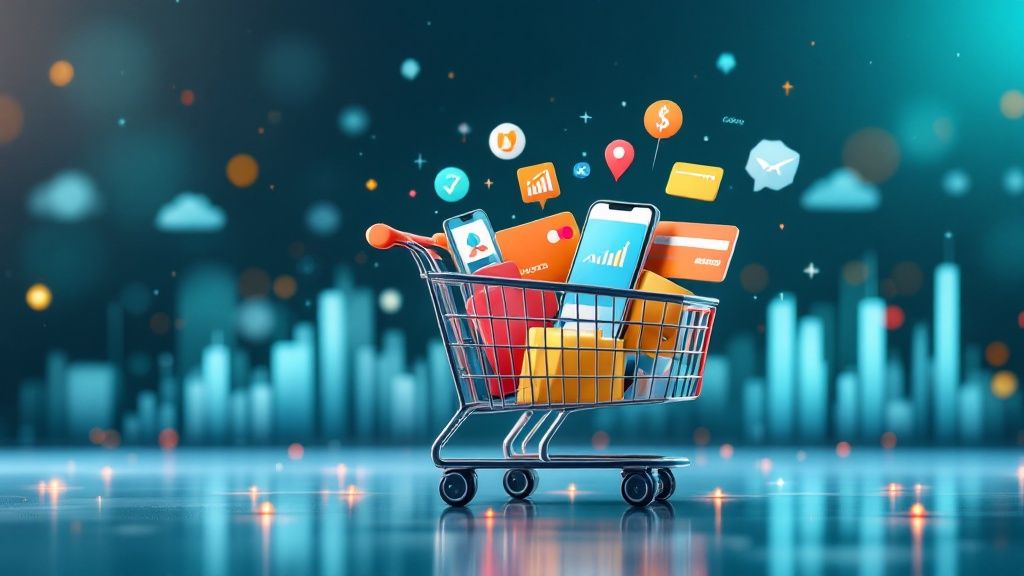What does CRM – Customer Relationship Management mean in Shopify?
August 24, 2024

In today’s world of e-commerce, the growth and success of your online store depends heavily on the relationships you build with your customers. This is where CRM – Customer Relationship Management comes in! As a Shopify store owner, it’s crucial to understand what CRM means and how it can benefit your business. In this article, we explore CRM in Shopify and its key features, as well as tips for choosing the right CRM for your store.
Understanding CRM and Its Importance in E-commerce
At its core, CRM is a strategy for managing interactions with customers and potential customers. It involves collecting data on every interaction between a customer and your business, analyzing that data, and using it to build more meaningful relationships with customers over time. CRM can help you personalize your marketing efforts and improve customer satisfaction, which can ultimately lead to increased sales and loyalty.
Defining CRM – Customer Relationship Management
CRM is defined by Shopify as “the set of practices, technologies, and strategies that companies use to manage and analyze customer interactions and data throughout the customer lifecycle.” This can include everything from collecting customer data, to creating targeted marketing campaigns, to providing excellent customer support.
One of the key benefits of CRM is that it allows businesses to gain a deep understanding of their customers. By tracking every interaction a customer has with your business, you can gain insights into their preferences, needs, and pain points. This information can then be used to create more targeted marketing campaigns and improve customer support.
The Role of CRM in E-commerce Businesses
For e-commerce businesses, customer relationships are especially important since customers do not have the opportunity to physically interact with products or employees. CRM can help bridge this gap and create the same level of personalization and connection that customers might expect from an in-person shopping experience.
One way that e-commerce businesses can use CRM is by creating personalized product recommendations. By analyzing a customer’s purchase history and browsing behavior, you can recommend products that are likely to be of interest to them. This can lead to increased sales and customer satisfaction.
Another way that e-commerce businesses can use CRM is by providing excellent customer support. By tracking customer interactions and preferences, you can provide more personalized support that meets their specific needs. This can lead to happier customers and increased loyalty.
Benefits of Implementing CRM in Your Shopify Store
There are numerous benefits to implementing CRM in your Shopify store. Here are just a few:
- Better customer service: With CRM, you can track customer interactions and provide more personalized support, leading to happier customers.
- Improved marketing campaigns: By analyzing customer data, you can better understand your target audience and create more targeted marketing campaigns.
- Increased sales: By providing personalized recommendations and offers, you can increase the likelihood of customers making a purchase.
- Improved customer loyalty: By building more meaningful relationships with customers, you can increase their loyalty to your brand.
- More efficient operations: By automating certain aspects of customer interactions, you can free up time for your team to focus on other areas of your business.
Overall, CRM is an essential strategy for any e-commerce business looking to improve customer satisfaction, increase sales, and build long-term customer loyalty. By implementing CRM in your Shopify store, you can gain valuable insights into your customers and create more personalized experiences that meet their specific needs.
Key Features of CRM in Shopify
Shopify is a popular e-commerce platform that offers a wide range of CRM features to help you better manage your customer relationships. Here are just a few:
Customer Data Management
Shopify’s customer data management features allow you to easily collect and organize customer data, such as purchase history, contact information, and more. This data can be used to personalize marketing efforts and improve customer support. You can also segment your customer data based on various criteria, such as demographics, purchase behavior, and more, to create targeted marketing campaigns and improve customer retention.
For instance, if you notice that a particular segment of your customers tends to purchase a certain type of product, you can create a targeted email campaign that highlights that product and offers a discount or promotion to encourage them to make another purchase.
Marketing Automation and Campaign Management
Shopify’s marketing automation and campaign management features allow you to create personalized emails, set up automated abandoned cart emails, and more. These features make it easy to create targeted marketing campaigns that will resonate with your customers.
For example, you can set up an abandoned cart email that automatically sends to customers who have left items in their cart without completing their purchase. This email can include a discount code or other incentive to encourage them to come back and complete their purchase.
Sales Tracking and Analytics
Shopify provides detailed sales tracking and analytics to help you better understand your customers’ purchasing habits. This information can be used to create more targeted offers and improve your store’s overall profitability.
For instance, you can use Shopify’s analytics to identify which products are selling the most, which customers are making the most purchases, and which marketing campaigns are driving the most sales. This information can help you make data-driven decisions about how to allocate your marketing budget and which products to focus on promoting.
Customer Support and Service Management
With Shopify’s customer support and service management features, you can easily track customer inquiries and provide personalized support. This leads to happier customers and improved brand loyalty.
For example, you can use Shopify’s customer support features to track customer inquiries and respond to them quickly and efficiently. You can also use the customer data you’ve collected to personalize your support and provide targeted recommendations or solutions to their problems.
Integration with Third-Party Apps and Services
Shopify integrates with a wide range of third-party apps and services, including email marketing tools, customer support platforms, and more. This allows you to customize your CRM experience to meet your specific business needs.
For instance, if you use a particular email marketing tool or customer support platform, you can integrate it with Shopify to streamline your workflow and improve your overall efficiency. This can help you save time and resources, while also improving your customer experience.
Overall, Shopify’s CRM features are designed to help you better understand your customers, personalize your marketing efforts, and improve your overall profitability. Whether you’re a small business owner or a large e-commerce retailer, Shopify’s CRM tools can help you take your customer relationships to the next level.
How to Choose the Right CRM for Your Shopify Store
As a Shopify store owner, you know how important it is to have a CRM system in place to manage your customer relationships. However, with so many options available, it can be challenging to choose the right one for your business. Here are a few tips to help you make the right decision:
Assessing Your Business Needs and Goals
Before choosing a CRM, it’s important to assess your business needs and goals. Consider what you hope to achieve with CRM and what features are most important to your business. For example, if you’re looking to streamline your sales process, you may want a CRM that offers robust lead management and sales forecasting tools. On the other hand, if you’re looking to improve customer service, you may want a CRM that offers advanced customer support features.
Comparing CRM Pricing and Plans
CRM pricing can vary widely, so it’s important to compare plans and costs before making a decision. Consider what features are included in each plan and how they align with your business goals. Some CRM platforms offer a free plan with limited features, while others offer more comprehensive plans at a higher cost. It’s important to find a plan that fits your budget while still offering the features you need to achieve your business goals.
Evaluating CRM Features and Customization Options
Consider the features and customization options available with each CRM. Look for a platform that offers the features you need to achieve your business goals and that can be customized to meet your unique needs. For example, if you have a complex sales process, you may want a CRM that offers customizable sales pipelines. Or, if you have a large team, you may want a CRM that offers user management and permissions settings.
Considering User Experience and Support
Finally, consider the user experience and support offered by each CRM platform. Look for a platform that is easy to use and that offers adequate support resources. This is especially important if you’re new to using CRM software or if you have a small team with limited technical expertise. Consider looking for a CRM platform that offers a knowledge base, community forum, or dedicated support team to help you get the most out of your CRM.
By choosing the right CRM for your Shopify store, you can improve customer relationships, increase sales, and ultimately, improve your business’s bottom line. Consider the tips above and choose the CRM that’s right for you.
Remember, choosing the right CRM is just the first step. Once you’ve selected a platform, it’s important to take the time to set it up properly and train your team on how to use it effectively. With the right CRM and the right strategy in place, you can take your Shopify store to the next level and achieve your business goals.
 Checkout Links
Checkout Links



